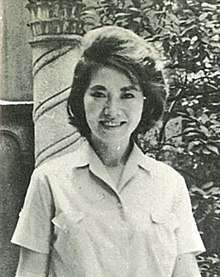Masako Togawa
Masako Togawa (戸川昌子, Togawa Masako) (23 March 1931 – 26 April 2016) was a Japanese Chanson singer/songwriter, actress, feminist, novelist, LGBTQQIAP community icon, former night club owner, metropolitan city planning panelist, music educator, born in Tokyo, 1933.[1][2]

Personal life
Masako Togawa grew up in "restricted circumstances" following the death of her father.[3] She worked as a typist for five years after leaving high school,[4] then, aged 23, she made her singing debut, at the well-known nightclub 'Gin-Pari'.[1] Ms Togawa has had several children, the last of whom was born when she was 48 years old. Not too much about her children is shared to the public.[5] Masako's appearance is often marked by a multi-coloured 'Afro' hairstyle. She has educated countless musicians to learn how to sing and compose.[5]
Chanson/club career
In 1967 Ms Togawa turned her sister’s coffee shop into a nightclub known as "Blue Room", Aoi Heya. Aoi Heya was known to be a celebrity hang out, lesbian night club, a chansonnier and in recent years, a live music club for excellent artists and composers.[6][7]
In 1975 she brought out a first record, "Lost Love", which was followed by "The Moral of The Story."[5]
In December 2011 Masako Togawa had to close the Blue Room, after 43 years, because of pressing financial difficulties, despite the endeavours of a "Blue Room Relief Fund".[6] In May 2012, Masako Togawa expressed a desire for "the [B]lue [R]oom [re]...born" [6] and now, there is a "Monday Blue Room", hosted by the "Tokyo Salavas".[6]
In February 2012, Togawa also began a "[B]lue [R]oom Grand Cabaret", delivered through a web TV channel, "Scatch.TV"[6] and Chanson classes, on the first and third Wednesdays of every month.[6] It would appear that her only concern was then that the venue might be "overflowing".[6]
Film and TV career
Masako Togawa was a leading character in the TV show, "Playgirl", 1969 - 1974. Like her novels, this too had a self-referential element, the plot centred on Masako, a mystery writer who creates an all-female company of detectives who uncover white collar crimes.[5] She also played in a 1964 film, "The Hunter’s Diary", adapted from stories she co-wrote, and in the television show Oinaru genei, based on her first novel.[5]
Writing Career and Critical Reception
Masako Towaga began writing in 1961, backstage, between her stage appearances, and her first work The Master Key was published a year later, in 1962, for which she was awarded the prestigious Edogawa Rampo Prize.[1] The story is set in the same apartment she grew up in with her mother.[5] Her second novel, The Lady Killer, followed in 1963, becoming a bestseller. It was adapted for both TV and film, and nominated for the Naoki Prize.[1]'
She wrote more than thirty novels and was one of the most popular mystery writers in Japan, with many of her stories based on her own life experience.[5]
Critical Reception The Times Literary Supplement called her "the P. D. James of Japan", but an anonymous Kirkus Reviews reviewer of Slow Fuse found that work, "sluggishly paced and indifferently written.... [an] hysterically overplotted soaper." [8]
Literary works
Please note: this list is as yet incomplete.
- Novels
- The master key. Translated 1984 by Simon Grove from the Japanese Ōinaru gen'ei.
- The lady killer. Translated 1985 by Simon Grove from the Japanese Ryōjin nikki, published 1963[1]
- A kiss of fire. Translated 1987 by Simon Grove from the Japanese Hi no seppun.
- Slow fuse. Translated 1995 by Simon Prentis from the Japanese Fukai shissoku.
- Short story
- The Vampire (Ellery Queen's Japanese Golden Dozen: The Detective Story World in Japan. Edited by Ellery Queen. Charles E. Tuttle Company, 1978)
External links
- https://twitter.com/kebaneko (in Japanese)
- http://www.virtualjapan.com/wiki/Togawa_Masako
- http://www.virtualjapan.com/wiki/Aoi_Heya (Blue Room page)
- https://www.youtube.com/watch?v=q13bW256OYk (a collage of Ms Togawa's nightclub work, from 2009).
- https://translate.google.com/translate?hl=en&langpair=ja%7Cen&u=http://gendai.net/articles/view/geino/136522&ei=HIX1UObtAcTH0QXwlID4CA - a poignant article, ultimately uplifting; poorly translated.
References
- Masako Togawa (1985). The Lady Killer. Penguin. ISBN 0-14-009269-2
- "戸川昌子さんが死去 シャンソン歌手で作家「最後までステージで歌い続けた」". ハフィントンポスト. 26 April 2016.
- Masako Togawa (1985). The Lady Killer. Penguin. ISBN 0-14-009269-2 {Note: this date is disputed - the page at Virtual Japan gives 23 March 1931.}
- Masako Togawa (1985). The Lady Killer. Penguin. ISBN 0-14-009269-2 {NOTE: the VJ page states she that she "dropped out" of high school.}
- "Togawa Masako".
- "Google Translate".
- http://www.virtualjapan.com/wiki/Togawa_Masako [NOTE: the VJ Blue Room page differs here]
- Masako Togawa. "SLOW FUSE". Kirkus Reviews.